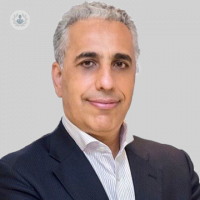How to manage breast pain (A.K.A mastalgia and mastodynia)
Written in association with:Many women will experience breast pain (also known as mastalgia and mastodynia) in their lifetime. Nevertheless, until the cause is determined, the pain can result in worrying thoughts. Professor Kefah Mokbel, an internationally renowned oncoplastic breast surgeon, shares his expertise with you. Read on to learn about the testing and management of breast pain from one of the UK’s top specialists.

How common is breast pain?
Breast pain (also known as mastalgia or mastodynia) is the most common breast symptom reported by women. In fact, 70% of women experience some degree of pre-menstrual tenderness or discomfort in the breast during their lifetime.
Are there types?
Breast pain can be unilateral or bilateral and is usefully classified as either cyclical or non-cyclical.
- Cyclical pain: Relating to menstruation – cyclical breast pain typically happens mid-cycle or is pre-menstrual.
- Non-cyclical: pain that is not related to the menstruation cycle and that occurs intermittently or continues for a long time.
Who should get tested if they have breast pain?
In the majority of cases, diagnostic imaging can be reserved for those within current screening guidelines.
- A full-field digital mammography (also called digital mammography) is recommended in all women who are experiencing breast pain and are aged 40 years or over.
- Breast imaging such as a mammogram and/or breast ultrasound scan should be also considered in younger women if they are at an increased risk of developing breast cancer due to a strong family history or other risk factors, especially if the pain affects one breast.
Some women will very likely not need breast imaging tests e.g. young women with cyclical breast pain and tenderness that affects both breasts. They can be reassured in a consultation about the innocent nature of their symptoms.
Pain is rarely the sole presenting feature of cancer and, for many women, breast pain does not need further investigation.
How is the pain investigated?
Some women require reassurance only (young women with bilateral and cyclical breast pain), and other women who will undergo diagnostic tests. Making a diagnosis includes eliminating potential musculoskeletal, cardiac and radiating nerve pain issues, which can usually be excluded with a detailed medical history and a tailored examination.
Patients might be offered:
- Pain charts: These include a linear visual with a scale of 1-10.
- 3D digital mammography: These are generally offered to women over 40.
- Ultrasound scan: These are generally offered to women under 40 years old.
How is breast pain managed?
The management of most cases can be successfully undertaken within the community. However, patients older than 40 and those with persistent symptoms should be referred to a breast specialist for a baseline evaluation and the creation of an agreed management plan.
Time
For the women who only require assurance that there is no underlying cancer, the pain usually resolves spontaneously within a few months.
Lifestyle
It is appropriate to recommend supportive measures such as wearing a well-fitted bra, and lifestyle changes:
- Reducing the intake of saturated animal fats
- Weight loss (if overweight)
- Regular exercise
- Reduced caffeine intake
Nutitional supplements
Nutritional supplements that moderate the activity of endogenous oestrogens have been shown to provide some benefit. These include omega 3 and flaxseed supplements, which are a source of omega-3 fatty acids and lignan precursors. Having said that, the impact of such supplements is likely to be modest and impacted by the fact that the vast majority of cases are self-limiting.
Painkillers
Ibuprofen or diclofenac gel can help relieve discomfort.
Medication
For patients who have persistent and severe breast pain that results in a significant illness (though these are the minority), simple analgesia (pain reliever) and pharmacological agents can be provided for a relief from symptoms.
In the more severe cases, the oestrogen receptor modulator tamoxifen can be prescribed at low doses (5-10 mg) for 3-6 months. It has more favourable side-effects in comparison to other second-line agents, such as the synthetic androgen danazol or the dopamine receptor agonist bromocriptine. Interestingly, cabergoline has been found to have a comparable effectiveness to bromocriptine, but with fewer adverse effects.
You can receive Dr Mokbel’s internationally renowned oncoplastic breast services - learn more and book your first consultation


